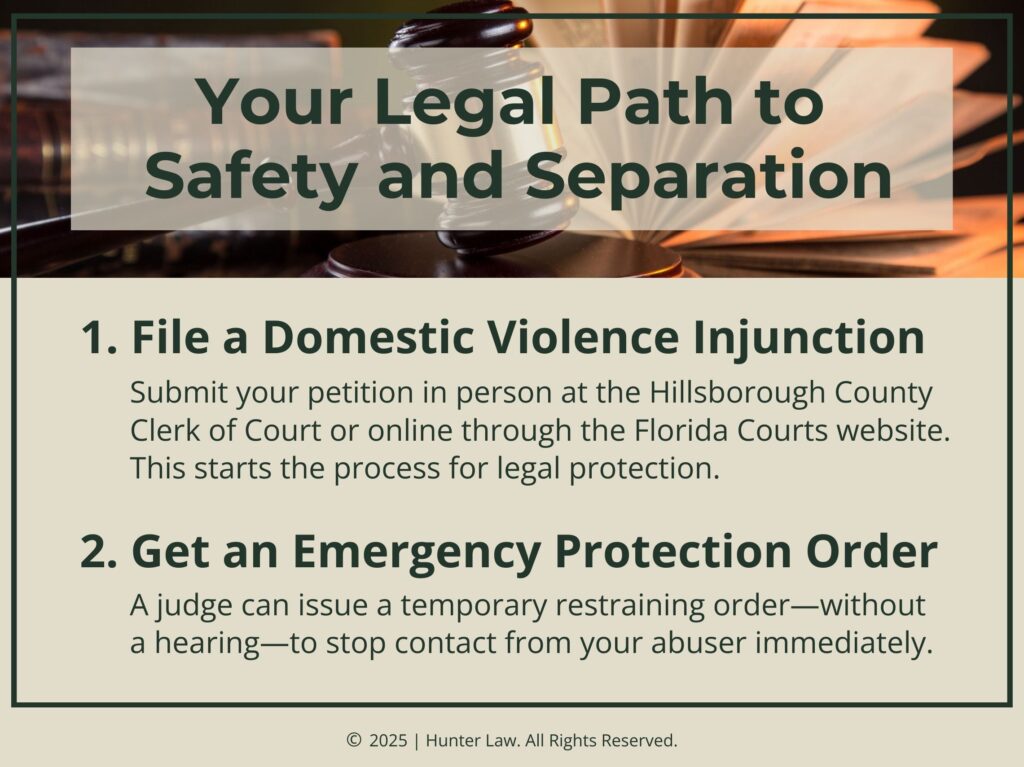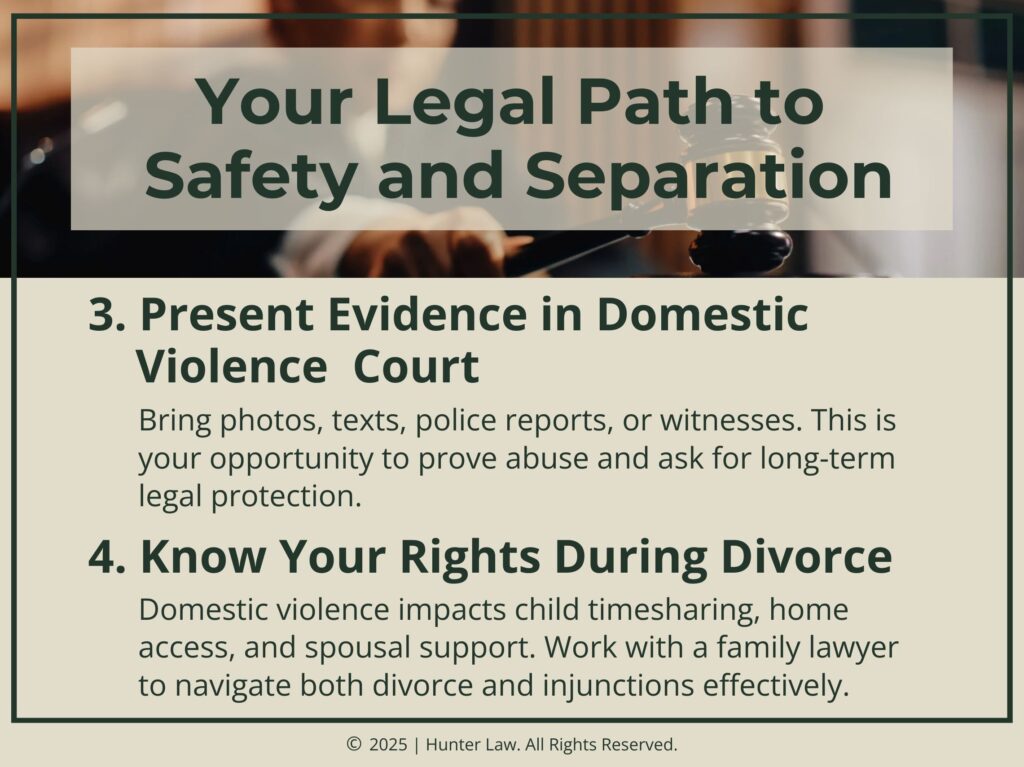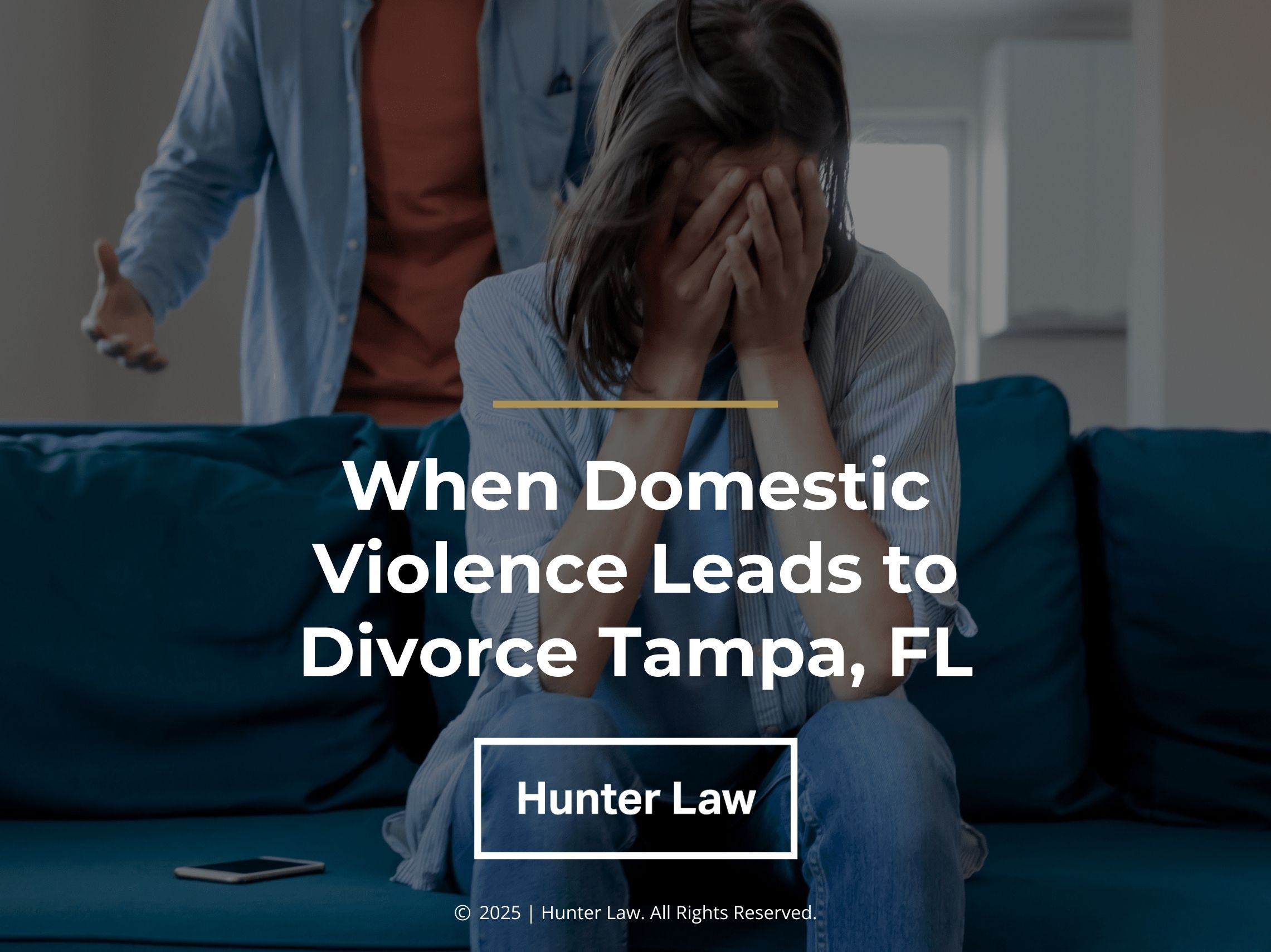When you’re facing domestic violence in Tampa, Florida, legal protection is available and often urgent. Florida law provides a direct path for victims to seek safety through domestic violence injunctions, often referred to in other states as “restraining orders.” These legal tools are designed to offer immediate relief and protection from abuse, threats, or harassment. Understanding your options and knowing what steps to take can make a powerful difference in your safety and future.
In this article, we’ll guide you through the full process of seeking a domestic violence injunction in Tampa: what these court orders include, who qualifies, how to file, what to expect in court, and how legal support from Hunter Law can strengthen your case. You’ll also learn how injunctions can impact parenting, housing, and overall peace of mind.
If you or someone you love is in danger, don’t wait. Contact Hunter Law now to speak with a compassionate, experienced family lawyer. We’ll help you understand your rights and take action to protect yourself immediately.
What Is a Domestic Violence Injunction?
A domestic violence injunction is a court order that protects individuals from abuse or threats of abuse by a current or former spouse, family member, co-parent, or someone with whom they live or have lived. In Florida, this legal measure falls under the broader category of Florida family law, which prioritizes the safety of individuals and families. These legal protections can be essential when emotional or physical harm threatens the well-being of anyone in the household.
The injunction can include a variety of protections, such as no-contact orders, removal of the abuser from a shared residence, and temporary timesharing decisions regarding children. It can also set boundaries on communication, require the respondent to stay away from specific locations, or place restrictions that safeguard the daily routines of the person seeking protection. At Hunter Law, we help Tampa residents navigate these injunctions with clarity and confidence, ensuring that every legal option is explored to secure the safety they deserve.
Who Can File for an Injunction in Tampa?
You may file for an injunction if you are a victim of domestic violence or if you have reason to believe you are in immediate danger. Common examples include physical abuse, threats, stalking, harassment, or false imprisonment. The law is designed to act quickly, especially in emergencies, through what is known as an emergency protection order. These orders are available to help victims reclaim a sense of security while the court process unfolds.
Even if no physical injury has occurred, fear of imminent harm may be sufficient grounds to file. Being in fear is the fundamental basis of a petition for an injunction. This can be from having been harmed in some way, or from being in harm in some way. Florida courts understand that emotional trauma and threats are just as serious as physical harm. If you’re unsure whether your situation qualifies, a family lawyer in Tampa, such as the experienced team at Hunter Law, can help you evaluate your options, explain your rights, and guide you in taking immediate legal action.

How to File for a Domestic Violence Injunction
The process begins at the Hillsborough County Clerk of Court or online through the Florida State Courts system. Acting swiftly is critical, especially when your safety or that of your children is at risk. Here’s a more detailed look at what you can expect:
- Complete the Petition: Visit your local courthouse or use Florida’s official domestic violence injunction forms to start your petition online. You’ll be asked to provide a detailed account of the abuse, threats, or harassment, describe your relationship with the respondent, and explain why you believe an injunction is necessary. The more specific and factual you can be, such as describing the exact dates and times of the incidents, the locations, what actually happened, and who was present, the more effective your petition will be in court. Attach color photographs of any bruises or injuries to yourself or others, or of damage to property, as exhibits, and make sure you reference the photographs in your narrative.
- Judge Reviews for Temporary Order: After reviewing your petition, a Florida judge may grant a temporary injunction on an ex parte basis (that is, without a hearing) on the same day, without notifying the abuser. This provides immediate legal protection until a full hearing can take place. The order may include no-contact provisions and other emergency measures.
- Full Hearing Scheduled: Within approximately 15 days, a hearing will be held where you and the respondent can present your sides. This is where the court decides whether to issue a final, ‘permanent’ injunction. It’s critical to attend this hearing, or your temporary order may expire and your case will be dismissed. Although a Final Judgment of Injunction sounds permanent, typically, injunctions are only issued for the period of time needed to keep you safe. Sometimes this period can be as brief as a matter of months, and sometimes an injunction can be in place for years. It is very rare for an injunction to be ‘permanent.”.
- Presenting Your Case: The hearing is your opportunity to prove abuse in court. Bring documentation such as text messages, color photographs, videos, voicemails, medical records, police reports, or witnesses who can corroborate your claims. A calm, organized presentation can help the judge understand the seriousness of your situation. Having a family lawyer with you in court can be invaluable at this stage, ensuring that your evidence is submitted correctly and your voice is clearly heard.

What the Injunction Can Include
A domestic violence injunction can provide several types of protection, each designed to create a safer and more stable environment for the victim and any children involved:
- Prohibit contact of any kind by the abuser: This includes phone calls, texts, emails, social media platforms, or physical presence at home, work, or school. This also includes prohibiting the abuser from trying to contact you through a third party, such as relatives, friends, or co-workers. The injunction may include your workplace, your vehicle, your gym, or any other place to which you routinely go.
- Grant exclusive use of shared residence: The court may order the abuser to leave a home, even if both parties are listed on the lease or deed.
- Set temporary child timesharing and support orders: Judges can immediately decide where children will live and who is responsible for support payments during the legal process.
- Require the surrender of firearms: To minimize danger, the court can require the respondent to turn over any weapons in their possession.
- Order mandatory counseling or intervention programs: Offenders may be required to complete batterers’ intervention programs, anger management, or substance abuse treatment, depending on the circumstances.
Each injunction is narrowly tailored to the victim’s specific needs. Judges review the details carefully to determine which protections are appropriate, always focusing on preventing further harm. These orders are legally binding and provide a critical layer of protection under Florida law. At Hunter Law, we take the time to understand every detail of your situation to ensure the court is presented with the strongest case possible. Our experience in Florida family law allows us to advocate for effective, enforceable protections that address your immediate concerns and future safety. If you’re unsure what type of injunction fits your circumstances, our team is ready to help guide you through the legal process with clarity and compassion.
How a Family Lawyer Can Help with Domestic Violence Cases in Tampa
While Florida law allows you to file for an injunction without an attorney, navigating the system can be stressful, especially during a crisis. A family lawyer from the best law firm in Tampa can help you build a strong case, represent you in court, and ensure your rights are protected throughout the process. Legal representation can also help you avoid procedural mistakes that might otherwise delay protection or weaken your petition.
Hunter Law’s legal team understands the sensitive nature of these situations and responds promptly, with confidentiality and compassion. We provide strategic support throughout every stage, from filing paperwork to appearing in domestic violence court, ensuring nothing is overlooked. If domestic violence is a factor in a divorce, parenting dispute, or injury claim, our team can coordinate support across both family law and personal injury law as needed. No matter how complex your situation may be, our attorneys work diligently to give you clarity, comfort, and legal security.

What Happens After the Injunction Is Granted?
Once a judge grants the final injunction:
- It becomes enforceable statewide: This means the order is legally binding in every county across Florida. Law enforcement agencies have access to the injunction and are required to enforce it.
- Any violations can result in arrest and criminal charges: If the restrained person violates the terms of the injunction, even by sending a text message or appearing uninvited at your home or workplace, they can be arrested and charged with a crime. This adds a crucial layer of protection.
- The court may issue additional orders: These may address child support, timesharing (parenting time), temporary financial support, or mandatory counseling for the respondent. These decisions are made based on the best interests of the children and the safety of all parties involved.
- You may return to court to modify or extend the injunction: Life circumstances can change, and Florida law allows for the injunction to be revisited. The court can adjust the order if you need more extended protection or changes in timesharing arrangements. Importantly, the abuser may ask the court to reduce the restrictions or terminate the injunction, which the court may consider. If you reconcile, you and the other party may agree for the injunction to be terminated.
It’s important to always keep a certified copy of the injunction with you. Inform relevant parties such as your employer, your child’s school, daycare providers, or property managers. The more people are aware of the injunction, the safer and more protected your daily environments become.
Facing Domestic Violence? Get Legal Help Today
If you’re facing domestic violence in Tampa, don’t wait to seek help. The law provides immediate options for safety, and our team at Hunter Law is here to walk you through each of them. From filing for a domestic violence injunction to gathering evidence and standing beside you in domestic violence court, we offer step-by-step legal guidance when you need it most. Every situation is different, and we tailor our approach to meet the unique circumstances of your case.
Your safety, family, and peace of mind are too important to leave to chance. With Hunter Law, you’ll work with a family lawyer who not only understands the law but also truly listens to your story. We act swiftly and with care to help you regain control, protect your rights, and start the path toward healing. Our team is committed to providing personalized, confidential legal support that empowers you to move forward with confidence. Contact us today for compassionate help when it matters most.


